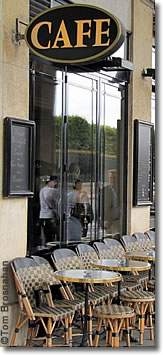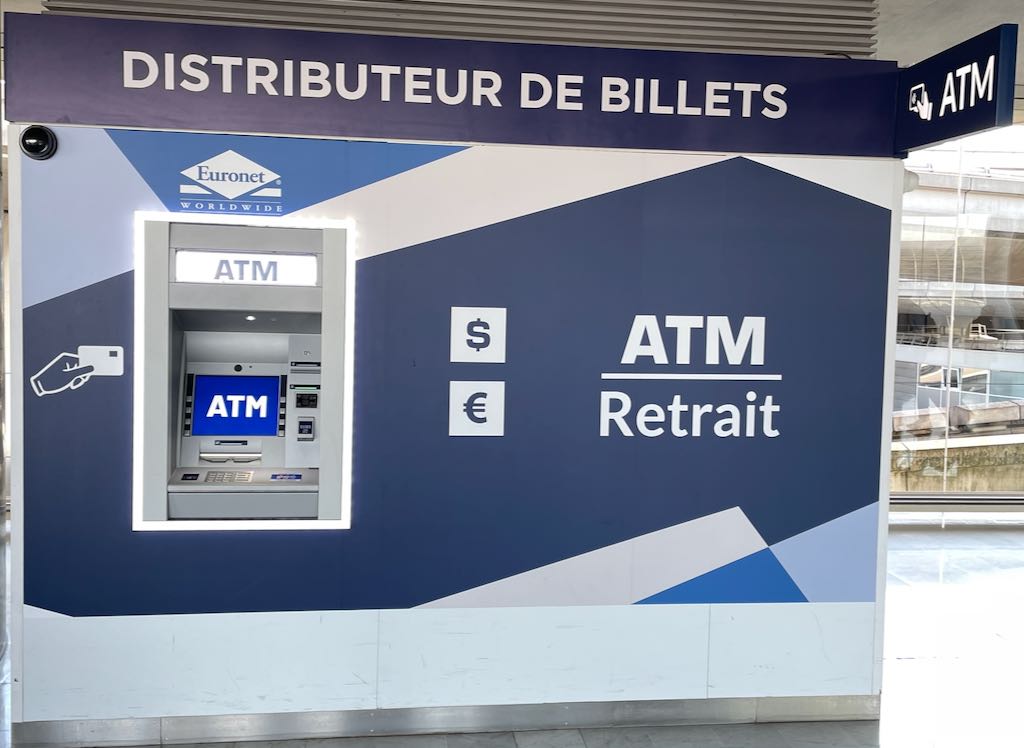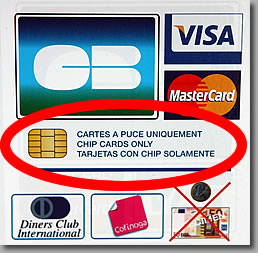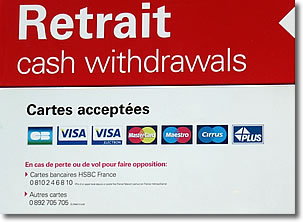 |
Money for Travel in France | |
| How to get and use money for trips to Paris & France, why your credit card may not work, and what to do about it. | ||
|
|
|
The unit of currency in France is the euro, as in other countries of the European Union. Bills/notes are in denominations of 5, 10, 20, 50, 100, 200 and 500 euros. More... Coins are 1, 2, 5, 10, 20 and 50 centimes, and 1 and 2 euros. More... Smartphone Payment AppsWhen we travel in France, we rarely use cash or even cards. We pay for 99% of our purchases—meals, transport tickets, activities, events, shopping, even coffees and drinks in cafés—using ApplePay because it works quickly, easily and securely virtually everywhere. Google Pay should work as well, and perhaps other such apps linked to your credit and debit cards. These and similar smartphone payment apps based on credit cards pay via your designated card but offer an extra level of security because your card info is not communicated for payment. Instead, a special one-time code is used. The merchant, shopkeeper or waiter never sees or handles your card. Here's how it's done:Set up the payment app on your phone, and when a waiter, shopkeeper or agent brings the ubiquitous portable payment device to you, touch your phone to it, it makes a sound, a receipt is printed, and you're on your way, with a complete record of all transactions in the payment app. Chip-and-PIN cards require no signature, but many US cards are chip-and-signature, which means you may have to sign a receipt when you pay. Credit & Debit CardsYou can use your favorite major credit or debit card to pay. As noted above, if it's a chip-and-PIN card, the payment device will be handed to you so you can input your PIN; if your card is chip-and-signature, you'll have to sign a receipt, just as at home. You can use your home bank ATM/cash card to withdraw euros from French distributeurs des billets (ATMs/cashpoints) or Retrait (cash witdrawal). Check with your bank to see if this will work without problems. Check with your bank to assure that your card is an RFID/chip-and-PIN (preferable) or chip-and-signature card. Businesses in France may not accept the older non-chip credit cards with only a magnetic stripe on the back. More... You may also want to check the exchange rate, charges and fees imposed by your bank or credit card company on foreign currency withdrawals, which may amount to 3% to 6% of your money. You may wish to apply for a card that imposes fewer fees on foreign transactions before you travel. We use Wise (formerly TransferWise) for our currency exchange and travel debit card because it offers very good exchange rates, interest on deposits, and low bank fees. More... Currency ExchangeFew transactions take place in cash anymore in France as in other countries. Money is now electronic. We go to France several times per year to update FranceTravelPlanner.com, so we regularly need to make payments in euros. To avoid bad exchange rates and excessive fees, we use a service called Wise (formerly TransferWise), which offers international electronic banking and currency exchange at advantageous rates. We set up a Wise account, transfer dollars to it from our bank, then convert the dollars to euros as we need them via the Wise smartphone app or website. Transfers and payments take place immediately (unlike banks, which may take days). Fees are low, or non-existent. We also ordered a Wise Debit Card, which can be used like any bank debit card to pay for things or to obtain cash from an ATM. We save money because Wise debits our account in the currency of the purchase, so there's no additional currency exchange commission or fee paid on the transaction. There are other, similar services available. We recommend this one because we researched it, we've used it for years, and we find it reliable and advantageous. More... But You'll Need a Little Euro Cash...Still, you should have some cash euros for a few payments: street markets, parking meters called horodateurs, and similar small-amount items. 1. In general, it is better to obtain or exchange money after arrival in France rather than at your home airport before flying, but note: currency exchange offices (bureau de change) have all but disappeared in France. People now withdraw cash euros from their home bank accounts using ATM cash machines all over France. 2. Airport currency exchange offices and ATMs may offer poorer rates of exchange than ATMs in the city center. More...
3. French banks do not exchange foreign cash. In fact, many French banks handle no cash at all except via their ATMs/cash machines. You cannot go into a bank and get money. You must use a machine. 4. Currency exchange offices (bureau de change) may exchange your home currency cash (dollars, pounds, yen, yuan, rubles, etc.) for euros—if you can find one; and they may take as much as 10% to 20% of your money for each exchange. Here's what you need to know about currency exchange to avoid ripoffs. More... Travel Costs & ValueMany people imagine that travel in Paris and France is expensive. It's not true! Some things in France are expensive, some are moderate in price, and others are positively cheap compared to prices in other countries. And then there's the question of value for money. An excellent 20-euro lunch is a bargain. A terrible 10-euro lunch is a ripoff. Euro for euro, France offers excellent value for money, even in "expensive" Paris. Here are specific examples of prices and costs in Paris. More... Refreshments in a café may seem expensive until you consider that you are not paying just for a cup of coffee, a soft drink or a glass of wine, but for ambience. An hour in a Parisian café, no matter what you drink, is one of life's great entertainments. In effect, you're paying rent for the enjoyable experience. (If you drink standing at the counter instead of sitting at a table, your drink may be cheaper. More...) Here are sample prices to give you a feel for your daily disbursements in Paris. Count Your Change!A good tip in Paris or anywhere: whenever you pay with cash, always count your change.
|
|
If your credit
card doesn't
have a computer chip in it, you probably
won't be able to use it much in France. More...
 |




